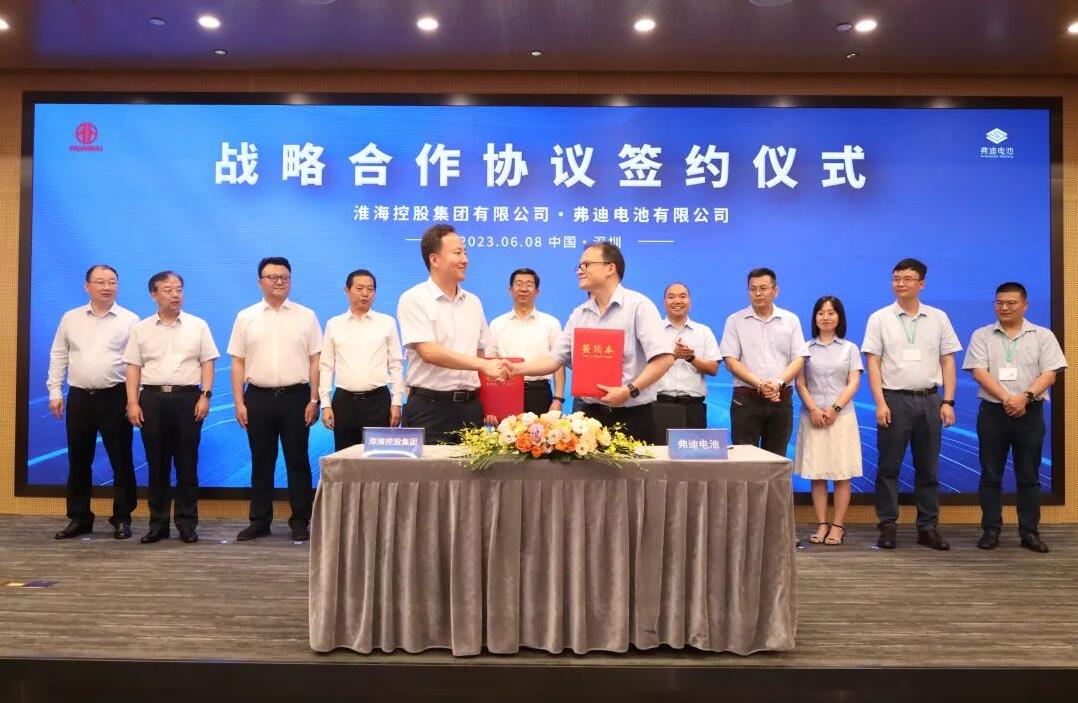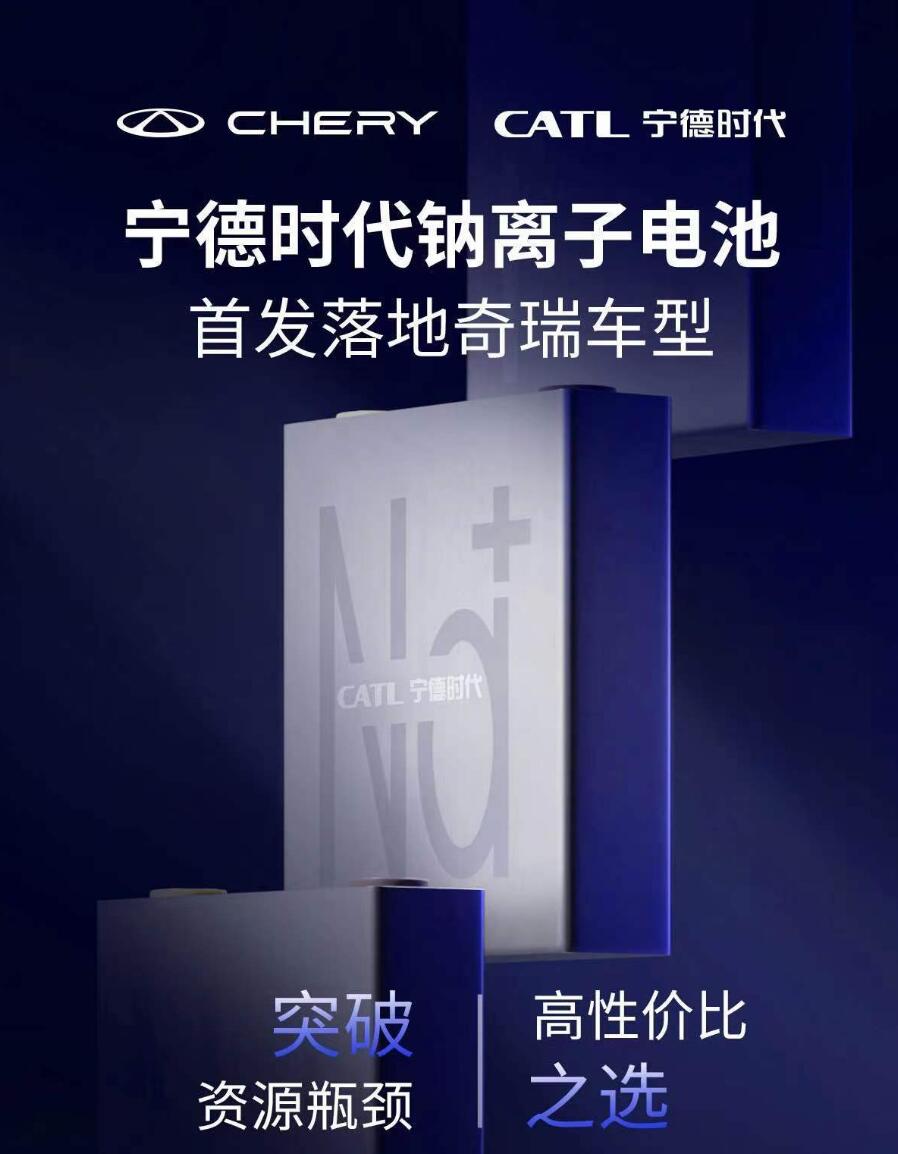CATL and BYD's sodium-ion batteries to be put into mass production will both be a mix of sodium-ion and lithium-ion batteries, according to local media.

(Image credit: CnEVPost)
BYD's progress in mass production of sodium-ion batteries does not seem to differ much from CATL's, although it has not announced the latest progress.
CATL and BYD's sodium-ion batteries will both be carried in mass-produced vehicles within the year, and they will both be a mix of sodium-ion and lithium-ion batteries, according to a report by local media 36kr today.
CATL's sodium-ion battery will be installed in the first model of Chery's new energy vehicle (NEV) brand iCAR, which is expected to be launched in the fourth quarter of this year, according to the report.

(Image credit: CnEVPost)
The sodium-ion battery will also be used in Chery's small NEVs, such as the QQ Ice Cream and the Little Ant, the report said.
With the big rise in lithium prices last year, leading battery makers including BYD and CATL have accelerated the pace of sodium-ion battery development.
BYD's sodium-ion battery will also be in mass production in the second half of the year, and the first model to carry the battery will be the Seagull, the report said, citing a BYD source.
The battery will also be a hybrid sodium-ion and lithium-ion battery, according to the report.
Sodium-ion batteries cost less, but currently have low energy density.
The energy density of sodium-ion batteries is now about similar to that of lithium iron phosphate batteries around 2014, the latter of which can only support a range of about 150km in small micro vehicles, the 36kr report noted.
CATL unveiled its first-generation sodium-ion battery on July 29, 2021, saying that the energy density of the single cell had reached 160Wh/kg.
The company said at the time that the energy density of the first-generation sodium-ion battery was slightly lower than that of lithium iron phosphate batteries. However, it has obvious advantages in low-temperature performance and fast charging, especially in high-power application scenarios in alpine regions.
CATL's next-generation sodium-ion battery will have an energy density exceeding 200Wh/kg, it said at the 2021 launch event.
Sodium-ion batteries are expected to be carried in electric vehicles, said Huang Qisen, vice president of CATL research institute, at a forum related to sodium-ion batteries on November 29, 2022.
As for applications in passenger cars, sodium-ion batteries can generally meet the needs of models with a range of up to 400 kilometers, Huang said at the forum.
With its pioneering AB battery system integration technology, CATL has achieved a mix of sodium ion and lithium ion, allowing them to complement each other and thus increase the energy density of the battery system, Huang said at the time.
This approach is expected to enable sodium-ion batteries to support electric vehicle models with a range of up to 500 kilometers, he said, adding that models with that range account for 65 percent of the market share, meaning the use of sodium-ion batteries is promising.
CATL's sodium-ion batteries will first be used in Chery's models, it announced on April 16.
Last November, there were several rumors that BYD's sodium-ion battery would be mass-produced in 2023 and that the first model to be equipped with the battery would be the Seagull. But none of these rumors were confirmed.
Earlier today, LatePost reported that BYD had planned to put the sodium-ion battery in the new Seagull model in the second quarter of this year, but that plan has been delayed.
BYD responded by saying that the information was untrue, the LatePost story noted.
BYD launched the Seagull and started pre-sales of it on the first day of the Shanghai auto show on April 18, and the model is the latest addition to its Ocean series.
The car is available in three versions, with pre-sale prices of RMB 78,800 ($11,450), 83,800 and 95,800 respectively.
Notably, the model uses BYD's blade batteries based on lithium iron phosphate chemistry with pack capacities of 30.08 kWh and 38.88 kWh, respectively.
The car is offered in two range versions, with the lower-priced two models having a CLTC range of 305 km and the highest-priced version having a range of 405 km.
The Seagull received more than 10,000 orders in the 24 hours after pre-sale began, BYD said yesterday.
($1 =RMB 6.8837)
Chery to be 1st automaker to adopt CATL's sodium-ion batteries
The post CATL, BYD's sodium-ion batteries both to be in mass production within this year, report says appeared first on CnEVPost.
For more articles, please visit CnEVPost.





 The unveiling of the Sehol EX10 test vehicle means that sodium-ion batteries are starting to be used in passenger cars, after the new batteries were mainly used in electric two-wheelers and for energy storage.
The unveiling of the Sehol EX10 test vehicle means that sodium-ion batteries are starting to be used in passenger cars, after the new batteries were mainly used in electric two-wheelers and for energy storage.